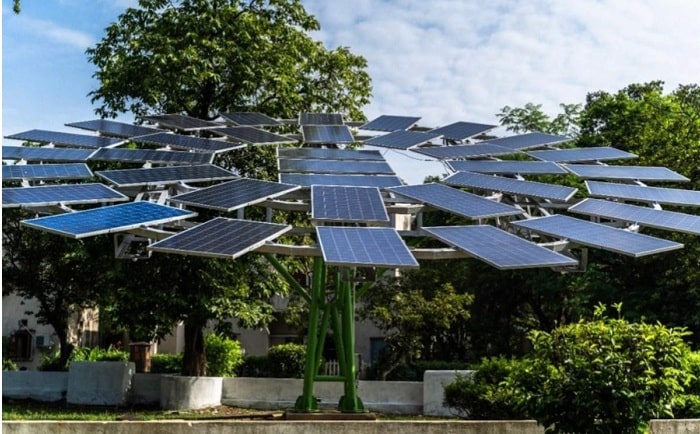In a bid to promote renewable energy, CSIR-CMERI developed the world’s largest solar tree which is installed in Durgapur, West Bengal. Apart from this, CSIR-CMERI collaborated with NSIE to boost the solar energy sector in the country.
As per Director of CMERI, Harish Hirani, ‘ This is the largest solar tree as per our knowledge producing up to 11,500 watts (11.5kw). The second-largest tree has been set up in London and produces around 8.6kw.’ He further added,’ Producing around 12,000–14,000 units of clean and green power in a year, the solar tree has the potential to save 10–12 tons of CO2 from being released into the atmosphere every year. This solar tree is a quantum leap towards making energy reliant and carbon-negative India.’
Key takeaways
1- The main obstacle while installing the solar panels on such a large scale was the availability of land.
2- The solar panels can be adjusted to get the maximum amount of renewable energy.
3- The solar tree has been developed at a cost of Rs. 7.5 lakh.
4- As per several experts, solar trees use less space and produce more energy per unit area. However, the cost of solar tree panels is double to that of the solar rooftop panels.
5- The shadow area is minimum in case of solar trees. Thus, they can be installed in agricultural farms as an alternative to diesel to run pumps, e-tractors, etc., as per the scientists at CMERI.
6- The solar tree has been designed so that each panel gets the maximum exposure of sunlight and the least amount of shadow is created under it.
7- The extra energy can be fed to an Energy Grid.
8- The solar tree can prove to be boon and can be lined up with the existing Pradhan Mantri Kisan Urja Suraksha evem Utthan Mahabhiyan (PM KUSUM) Scheme.
Apart from this, two Indian Institutions have signed an MoU to strengthen the solar energy sector in the country. The MoU signed by the Council of Scientific and Industrial Research-Central Mechanical Engineering Research Institute (CSIR-CMERI) and the National Institute of Solar Energy (NSIE) states that they will carry out joint field studies for developing different solar technologies.
Under this, solar power projects, decentralization of solar energy, solar rooftop systems, etc. will be covered. Several studies will also be carried out dealing with grid integration, recycling of energy and disposal of solar panels.





































